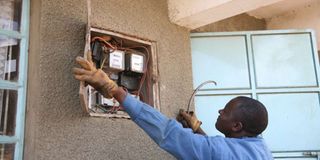Premium
Reprieve as November power bills dim slightly

A Kenya Power technician inspects an electricity metre.
What you need to know:
- Presidential task force working to ease the burden on consumers.
- Marginal relief as sector regulator cuts forex charge on electricity for the period.
Households and businesses have got a reprieve following a slight drop in forex charge on electricity bills for this month.
The Energy and Petroleum Regulatory Authority (Epra) said in a notice that the foreign exchange rate fluctuation adjustment (FERFA) for November had been lowered to 73.42 cents per kilowatt-hour(kWh) unit, down from last month’s Sh1.03.
“Pursuant to Clause 2 of Part III of the schedule of tariffs 2018, notice is given that all prices for electrical energy specified in Part II of the said schedule will be liable to a foreign exchange fluctuation adjustment of plus 73.42 cents per kWh for all meter readings taken in November 2021,” Epra director-general Daniel Kiptoo said in the gazette notice yesterday.
The reduction in FERFA charges cancelled out the effect of an increase in the Fuel Cost Charge (FCC) for November power bills to Sh4.21 per kWh-- the highest since July 2018 when it hit Sh4.60 due to rising fuel prices.
The energy regulator increased the FCC by 24 cents from Sh3.97 in October—marking a straight fourth month of rises due to higher diesel costs as increased demand has pushed up the prices of global crude oil.
The increase in FCC has, however, been fully offset by the fall in the FERFA, which means electricity consumers will enjoy slightly lower power bills in November compared to last month.
The rising electricity prices in past months had piled pressure on inflation as households and businesses endured financial hardships due to layoffs, salary chops, and reduced earnings in the wake of the Covid-19 that has turned life on its head since its advent in the first quarter of last year.
The costs of energy and transport have a significant weighting in the basket of goods and services that is used to measure inflation in Kenya.
Fuel prices hit a historic high in September with a litre of petrol selling at Sh134.72 in Nairobi while diesel and kerosene reached Sh115.5 and Sh110.82 respectively for the same quantity, piling pressure on the cost of living.
Meanwhile, volatility of the Kenyan shilling means its continued weakening will expose consumers to larger bills in the coming months.
The Presidential Taskforce on Review of PPAs has recommended that all new PPAs should be denominated in the Kenyan shilling to cushion consumers against high power bills.
“Most of the PPAs executed between the off-taker and IPPs in the country are denominated in foreign currency. Payments due to the IPPs from Kenya Power are either in US dollars or Euros.
“The government bears the responsibility to make dollars or euros available, while the off-taker covers any exchange rate fluctuation risks as well as inflation, bypassing the additional cost to consumers,” the John Ngumi-led taskforce noted in its report to President Uhuru Kenyatta.
It added: “The task force recommends that all future PPAs should be denominated in Kenya shillings.”





